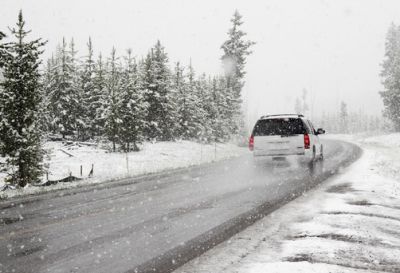
How To Protect Your Car From Road Salt
Of the many conditions you'll drive through in your car's lifetime, road salt probably has the worst effect on your car's body. If you live in the majority of states that use road salt, you've seen your fair share of rusty cars and know it can happen to you too. Unfortunately it may not be possible to completely protect your car from the corrosive effects of salt. But with a little extra maintenance in the winter months you can help prevent rust much longer.
States That Use Road Salt
Before taking steps to protect your car, it helps to know if and how much your state salts its roads. Regardless of where you live, you'll probably drive on salty roads at some point. Here is a list of states that use salt and how many tons per lane, per mile are used over the course of an average winter season:
New England
- Maine: 8 tons/mile
- Massachusetts: 19 tons/mile
- New Hampshire: 16 tons/mile
- Vermont: 17 tons/mile
Mid-Atlantic Region
- Delaware: 9 tons/mile
- Maryland: 7 tons/mile
- New Jersey: 7 tons/mile
- New York: 17 tons/mile
- Virginia: 3 tons/mile
- West Virginia: 6 tons/mile
Great Lakes Region
- Illinois: 7 tons/mile
- Indiana: 9 tons/mile
- Michigan: 13 tons/mile
- Ohio: 9 tons/mile
- Wisconsin: 9 tons/mile
Plains Region
- Iowa: 4 tons/mile
- Minnesota: 5 tons/mile
- Missouri: 1 ton/mile
- Nebraska: 2 tons/mile
- North Dakota: unknown amount
- Oklahoma: 2 tons/mile
- South Dakota: 1 ton/mile
Rockies And Western Region
- Alaska: 1 ton/mile
- California: 3 tons/mile
- Idaho: <1 ton/mile
- Nevada: 2 tons/mile
- New Mexico: <1 ton/mile
According to this list, which comes from the Transportation Research Board, New England drivers have to deal with the most salt on their roads.
Steps To Preventing Road Salt Damage
- Have your car waxed before winter
- Pretreat the undercarriage at a collision shop before winter
- Have a mechanic inspect your car for issues before or during winter
- Get your car washed after a snow or ice storm
- Wash your car two at least to three times a month
- Don't forget about spraying off the underside
- Avoid driving through puddles
- Keep your distance when driving behind plows and salt trucks
- Repair chips or scratches in the paint right away
What Are The Risks From Road Salt Damage?
Adding salt to the roads is obviously meant to be helpful as it melts dangerous ice. However, salt doesn't just cause rust to your car's body; it can also create rust in places you can't see.
When rust forms on your undercarriage, which is completely exposed to the elements, it can be dangerous.
Rust can cause damage to:
- The exhaust system
- Your muffler
- Coil springs
- The subframe
- Your hydraulic brake system
- The axel
Because these are all essential for safety, it's important to watch for damage to the undercarriage and any warning signs that may appear on your dash. Luckily, most modern cars alert you to unseen issues with a warning light. It's important to get these warnings checked out immediately, especially if it's a brake warning.
Can Junk Cars Be Donated To Charity?
Yes! If your car has succumbed to rust you may think its life is over, but there's still hope. Many people are unaware that they can donate their old, rusty or otherwise junky car to Wheels For Wishes. Not only will we tow away your car for free, we'll also give you a tax deduction for your car donation!
Wheels For Wishes makes it easy to donate online or over the phone at 1-855-278-9474. Our car donation program is also an easy way to support your local chapter of Make-A-Wish! All you need to do is donate your car today and it will be on its way to making a difference in your community.







